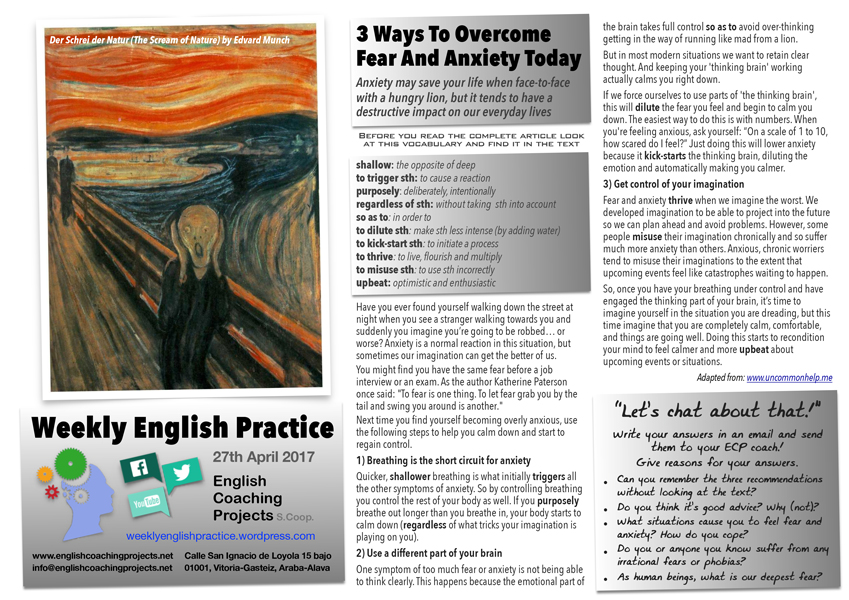Click on the image to download the pdf
Anxiety may save your life when face-to-face with a hungry lion, but it tends to have a destructive impact on our everyday lives
Before you read the complete article look at this vocabulary and find it in the text:
shallow: the opposite of deep
to trigger sth: to cause a reaction
purposely: deliberately, intentionally
regardless of sth: without taking sth into account
so as to: in order to
to dilute sth: make sth less intense (by adding water)
to kick-start sth: to initiate a process
to thrive: to live, flourish and multiply
to misuse sth: to use sth incorrectly
upbeat: optimistic and enthusiastic
Have you ever found yourself walking down the street at night when you see a stranger walking towards you and suddenly you imagine you’re going to be robbed… or worse? Anxiety is a normal reaction in this situation, but sometimes our imagination can get the better of us.
You might find you have the same fear before a job interview or an exam. As the author Katherine Paterson once said: “To fear is one thing. To let fear grab you by the tail and swing you around is another.”
Next time you find yourself becoming overly anxious, use the following steps to help you calm down and start to regain control.
1) Breathing is the short circuit for anxiety
Quicker, shallower breathing is what initially triggers all the other symptoms of anxiety. So by controlling breathing you control the rest of your body as well. If you purposely breathe out longer than you breathe in, your body starts to calm down (regardless of what tricks your imagination is playing on you).
2) Use a different part of your brain
One symptom of too much fear or anxiety is not being able to think clearly. This happens because the emotional part of the brain takes full control so as to avoid over-thinking getting in the way of running like mad from a lion.
But in most modern situations we want to retain clear thought. And keeping your ‘thinking brain’ working actually calms you right down.
If we force ourselves to use parts of ‘the thinking brain’, this will dilute the fear you feel and begin to calm you down. The easiest way to do this is with numbers. When you’re feeling anxious, ask yourself: “On a scale of 1 to 10, how scared do I feel?” Just doing this will lower anxiety because it kick-starts the thinking brain, diluting the emotion and automatically making you calmer.
3) Get control of your imagination
Fear and anxiety thrive when we imagine the worst. We developed imagination to be able to project into the future so we can plan ahead and avoid problems. However, some people misuse their imagination chronically and so suffer much more anxiety than others. Anxious, chronic worriers tend to misuse their imaginations to the extent that upcoming events feel like catastrophes waiting to happen.
So, once you have your breathing under control and have engaged the thinking part of your brain, it’s time to imagine yourself in the situation you are dreading, but this time imagine that you are completely calm, comfortable, and things are going well. Doing this starts to recondition your mind to feel calmer and more upbeat about upcoming events or situations.
“Let’s chat about that!”
Write your answers and send them by email to your ECP coach. Why not record your voice too? Listen to yourself speak and identify what you have to improve on 🙂
Give reasons for your answers.
- Can you remember the three recommendations without looking at the text?
- Do you think it’s good advice? Why (not)?
- What situations cause you to feel fear and anxiety? How do you cope?
- Do you or anyone you know suffer from any irrational fears or phobias?
- As human beings, what is our deepest fear?
Adapted from: www.uncommonhelp.me


